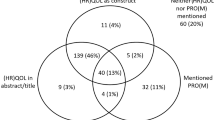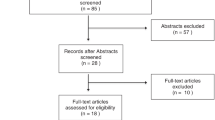Abstract
Purpose
This review paper aimed to draw together the findings of qualitative research into the symptom experience of adult cancer patients in order to develop a better understanding of symptom experiences following cancer treatment.
Methods
Systematic review and meta-synthesis techniques were used to identify, appraise and synthesise the relevant literature.
Results
A thematic account of shared symptom experiences reported across papers is presented. Four main themes are discussed: interaction with health services, changing relationships, changing self and coping. In addition the range of symptoms reported across qualitative cancer research is highlighted.
Conclusions
Unexpected symptoms can have negative effects on patients who need to be better prepared for long-term symptom experiences. In addition, it is important to acknowledge that patients’ symptom experiences do not happen in isolation and should be addressed holistically within the context of patients’ lives.

Similar content being viewed by others
References
Portenoy RK, Thaler HT, Kornblith AB, Lepore JM, Friedlander-Klar H, Coyle N, Smart-Curley T, Kemeny N, Norton L, Hoskins W et al (1994) Symptom prevalence, characteristics and distress in a cancer population. Qual Life Res 3:183–189
Molassiotis A, Zheng Y, Denton-Cardew L, Swindell R, Brunton L (2010) Symptoms experienced by cancer patients during the first year from diagnosis: patient and informal caregiver ratings and agreement. Palliat Support Care 8:313–324
Tishelman C, Degner LF, Rudman A, Bertilsson K, Bond R, Broberger E, Doukkali E, Levealahti H (2005) Symptoms in patients with lung carcinoma: distinguishing distress from intensity. Cancer 104:2013–2021
Cooley ME, Short TH, Moriarty HJ (2003) Symptom prevalence, distress, and change over time in adults receiving treatment for lung cancer. Psycho-Oncol 12:694–708
Ashbury FD, Findlay H, Reynolds B, McKerracher K (1998) A Canadian survey of cancer patients’ experiences: are their needs being met? J Pain Symptom Manage 16:298–306
Broberger E, Tishelman C, Von Essen L (2005) Discrepancies and similarities in how patients with lung cancer and their professional and family caregivers assess symptom occurrence and symptom distress. J Pain Symptom Manage 29:572–583
Rhodes VA, Watson PM (1987) Symptom distress-the concept: past and present. Semin Oncol Nurs 3:242–247
Hollen P, Gralla R, Kris M (1993) Quality of life assessment in individuals with cancer: testing the lung cancer symptom scale (LCSS). Eur J Cancer 29:S51–S58
Osoba D (ed) (1991) Effect of cancer on quality of life. CRC, Boca Raton
Morasso G, Capelli M, Viterbori P, Di Leo S, Alberisio A, Costantini M, Fiore M, Saccani D, Zeitler G, Verzolatto N, Tirelli W, Lazzari L, Partinicio M, Borzoni G, Savian C, Obertino E, Zotti P, Ivaldi GP, Henriquet F (1999) Psychological and symptom distress in terminal cancer patients with met and unmet needs. J Pain Symptom Manage 17:402–409
Lobchuk MM (2003) The memorial symptom assessment scale: modified for use in understanding family caregivers’ perceptions of cancer patients’ symptom experiences. J Pain Symptom Manage 26:644–654
Sherwood G (1999) Meta-synthesis: merging qualitative studies to develop nursing knowledge. Int J Human Caring 3:37–42
Rycroft-Malone J, Seers K, Titchen A, Harvey G, Kitson A, McCormack B (2004) What counts as evidence in evidence-based practice? Nurs Health Care Manage Policy 47(1):81–90
Sackett DL, Rosenberg WMC, Gray JA (1996) Evidence based medicine; what it is and what it isn’t. BMJ 312:71–72
Flemming K (2007) The knowledge base for evidence-based nursing: a role for mixed methods research? Adv Nurs Sci 30:41–51
Sackett DL, Richardson WS, Rosenberg W, Hayes RB (1997) Evidence based medicine: how to practice and teach EBM. Churchill Livingstone, Edinburgh
Hannes K, Lockwood C (2011) Pragmatism as the philosophical foundation for the Joanna Briggs meta-aggregative approach to qualitative evidence synthesis. J Adv Nurs 67:1632–1642
Denieffe S, Gooney M (2011) A meta-synthesis of women’s symptoms experience and breast cancer. Eur J Cancer Care 20(4):424–435
Scott JA, Lasch KE, Barsevick AM, Piault-Louis E (2011) Patients experiences with cancer related fatigue: a review and synthesis of qualitative research. Oncol Nurs Forum 38(3):E191–E203
Shaw RL (2010) Conducting literature reviews. In: Forrester M (ed) Doing qualitative research in psychology: a practical guide. Sage, London, pp 39–52
Dixon-Woods M, Shaw RL, Agarwal S, Smith JA (2004) The problem of appraising qualitative research. Qual Saf Health Care 13:223–225
Dixon-Woods M, Sutton A, Shaw RL, Miller T, Smith J, Young B, Bonas S, Booth A, Jones D (2007) Appraising qualitative research for inclusion in systematic reviews: a quantitative and qualitative comparison of three methods. J Health Service Res Policy 10(1):43–53
Malpass A, Shaw A, Sharp D, Walter F, Feder G, Ridd M, Kessler D (2009) “Medication career” or “moral career”? the two sides of managing anti-depressants: a meta-ethnography of patients’ experience of anti-depressants. Soc Science Med 68:154–168
Critical Appraisal Skills Programme (1998) Critical Appraisal Skills Programme (CASP) (1998) Collaboration for qualitative methodologies
Chan CWH, Molassiotis A (2000) The impact of fatigue on Chinese cancer patients in Hong Kong. Support Care Cancer 9:18–24
Molassiotis A, Stricker CT, Eaby B, Velders L, Coventry PA (2008) Understanding the concept of chemotherapy-related nausea: the patient experience. Eur J Cancer Care 17(5):444–453
Magnusson K, Möller A, Ekman T, Wallgren A (1999) A qualitative study to explore the experience of fatigue in cancer patients. Eur J Cancer Care 8(4):224–232
Bergkvist K, Wengstrom Y (2006) Symptom experiences during chemotherapy treatment-with focus on nausea and vomiting. Eur J Oncol Nurs 10(1):21–29
Schnur JB, Ouellette SC, Dilorenzo TA, Green S, Montgomery GH (2011) A qualitative analysis of acute skin toxicity among breast cancer radiotherapy patients. Psycho-Oncol 20(3):260–268
Spichiger E, Rieder E, Müller-Fröhlich C, Kesselring A (2012) Fatigue in patients undergoing chemotherapy, their self-care and the role of health professionals: A qualitative study. Eur J Oncol Nurs 16(2):165–171
Wilmoth MC, Hatmaker-Flanigan E, LaLoggia V, Nixon T (2011) Ovarian cancer survivors: qualitative analysis of the symptom of sexuality. Oncol Nurs Forum 38(6):699–708
Gater A, Abetz-Webb L, Battersby C, Parasuraman B, McIntosh S, Nathan F, Piault EC (2011) Pain in castration-resistant prostate cancer with bone metastases a qualitative study. Health Qual Life Outcomes 9
Krishnasamy M (1997) Exploring the nature and impact of fatigue in advanced cancer. Int J Palliat Nurs 3(3):126–131
Curt GA, Breitbart W, Cella D, Groopman JE, Horning SJ, Itri LM, Johnson DH, Miaskowski C, Scherr SL, Portenoy RK, Vogelzang NJ (2000) Impact of cancer-related fatigue on the lives of patients: new findings from the fatigue coalition. Oncol 5:353e–360e
Graffigna G, Vegni E, Barello A, Olson K, Bosio CA (2011) Studying the social construction of cancer-related fatigue experience: the heuristic value of Ethnoscience. Patient Educ Couns 82:402–409
Johansson E, Wilson B, Brunton L, Tishelman C, Molassiotis A (2010) Symptoms before, during, and 14 months after the beginning of treatment as perceived by patients with lymphoma. Oncol Nurs Forum 37:E105–E113
Lowe M, Molassiotis A (2011) A longitudinal qualitative analysis of the factors that influence patient distress within the lung cancer population. Lung Cancer 74:344–348
Molassiotis A, Lowe M, Ellis J, Wagland R, Bailey C, Lloyd-Williams M, Tishelman C, Smith J (2011) The experience of cough in patients diagnosed with lung cancer. Support Care Cancer 19(12):1997–2004
Molassiotis A, Lowe M, Blackhall F, Lorigan P (2011) A qualitative exploration of a respiratory distress symptom cluster in lung cancer: cough, breathlessness and fatigue. Lung Cancer 71(1):94–102
Stamataki Z, Burden S, Molassiotis A (2011) Weight changes in oncology patients during the first year after diagnosis a qualitative investigation of the Patients’ experiences. Cancer Nurs 34(5):401–409
Brunton L, Booker J, Molassiotis A (2012) Making sense of symptoms in men with prostate cancer: a longitudinal qualitative exploration. Intern J Urolog Nurs. In press
Molassiotis A, Rogers M (2012) Symptom experience and regaining normality in the first year following a diagnosis of head and neck cancer: a qualitative longitudinal study. Palliat Support Care. doi:10.1017/S147895151200020X
Rosedale M, Fu MR (2010) Confronting the unexpected: temporal, situational, and attributive dimensions of distressing symptom experience for breast cancer survivors. Oncol Nurs Forum 37(1):E28–E33
Knobf MT (2002) Carrying on: the experience of premature menopause in women with early stage breast cancer. Nurs Res 51(1):9–17
Boykoff N, Moieni M, Subramanian SK (2009) Confronting chemobrain: an in-depth look at survivors’ reports of impact on work, social networks, and health care response. J Cancer Surviv 3(4):223–232
Hopkinson J, Wright D, Corner J (2006) Exploring the experience of weight loss in people with advanced cancer. J Adv Nurs 54:304–312
Knobf MT (2008) “Coming to Grips” with chemotherapy-induced premature menopause. Health Care Women Int 29(4):384–399
Senn B, Gafner D, Happ MB, Eicher M, Mueller MD, Engberg S, Spirig R (2011) The unspoken disease: symptom experience in women with vulval neoplasia and surgical treatment: a qualitative study. Eur J Cancer Care 20(6):747–758
Gysels MH, Higginson IJ (2011) The lived experience of breathlessness and its implications for care: a qualitative comparison in cancer, COPD, heart failure and MND. BMC Palliate Care 10:15
Tsai S-L, Lin H-R, Chao TY, Lin PF (2010) The fatigue experiences of older Taiwanese women with breast cancer. J Clin Nurs 19(5-6):867–875
Tighe M, Molassiotis A, Morris J, Richardson J (2011) Coping, meaning and symptom experience: a narrative approach to the overwhelming impacts of breast cancer in the first year following diagnosis. Eur J Oncol Nurs 15(3):226–232
Lindqvist O, Rasmussen BH, Widmark A (2008) Experiences of symptoms in men with hormone refractory prostate cancer and skeletal metastases. Eur J Oncol Nurs 12(4):283–290
Ream E, Richardson A (1997) Fatigue in patients with cancer and chronic obstructive airways disease: a phenomenological enquiry. Intl J Nurs Stud 34(1):44–53
Bennett B, Goldstein D, Friedlander M, Hickie I, Lloyd A (2007) The experience of cancer- related fatigue and chronic fatigue syndrome: a qualitative and comparative study. J Pain Symptom Manage 34(2):126–135
Olson K (2007) A new way of thinking about fatigue: a reconceptualization. Oncol Nurs Forum 34:93–99
Molassiotis A, Wilson B, Brunton L, Chaudhary H, Gattamaneni R, McBain C (2010) Symptom experience in patients with primary brain tumours: a longitudinal exploratory study. Eur J Oncol Nurs 14:410–416
Dodd MJ, Miaskowski C, Paul SM (2001) Symptom clusters and their effect on the functional status of patients with cancer. Oncol Nurs Forum 28:465–470
Massie MJ (2004) Prevalence of depression in patients with cancer. J Natl Cancer Inst 32:57–71
Spelton ER, Sprangers MAG, Verbeek JHAM (2002) Factors reported to influence the return to work of cancer survivors: a literature review. Psycho-Oncol 11(2):124–131
Grunfeld EA, Cooper AF (2012) A longitudinal qualitative study of the experience of working following treatment for gynaecological cancer. Psycho-Oncol 21:82–89
Brown RF, Owens M, Bradley C (2011) Employee to employer communication skills: balancing cancer treatment and employment. Psycho-Oncol. doi:10.1002/pon.2107
Banning M (2011) Employment and breast cancer: a meta-ethnography. Eur J Cancer Care 20(6):708–719
Lopez VG, Copp G, Brunton L, Molassiotis A (2011) Symptom experience in patients with gynecological cancers: the development of symptom cIusters through patient narratives. J Supp Oncol 9(2):64–71
Conflict of interest
This work was made possible through funding from the UK’s Cancer Experiences Research Collaborative. There is no conflict of interest to declare. No primary data was used for this paper but the authors agree to allow the journal to review any secondary analysis carried out.
Author information
Authors and Affiliations
Corresponding author
Rights and permissions
About this article
Cite this article
Bennion, A.E., Molassiotis, A. Qualitative research into the symptom experiences of adult cancer patients after treatments: a systematic review and meta-synthesis. Support Care Cancer 21, 9–25 (2013). https://doi.org/10.1007/s00520-012-1573-x
Received:
Accepted:
Published:
Issue Date:
DOI: https://doi.org/10.1007/s00520-012-1573-x




